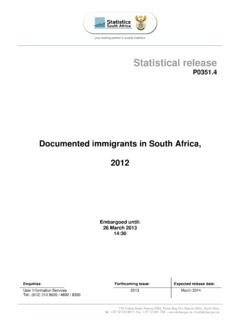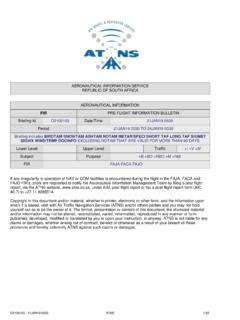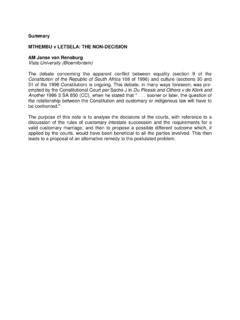Transcription of FREE STATE HIGH COURT, BLOEMFONTEIN REPUBLIC OF …
1 FREE STATE HIGH COURT, BLOEMFONTEINREPUBLIC OF south AFRICACase No. : 1565/2008In the matter between:-FOURWAYS PRECINCT (PTY) LTDA pplicantandSIGNAL CAPITAL AND SECURITIES (PTY) LTDR espondentIN RE:SIGNAL CAPITAL AND SECURITIESP laintiffandFOURWAYS PRECINCT (PTY) LTDD efendant_____HEARD ON:10 FEBRUARY 2011_____JUDGMENT BY: HANCKE, J_____DELIVERED: 24 FEBRUARY 2011_____[1]The applicant (the defendant in the main proceedings pending in this court) has launched an application in terms of the provisions of section 13 of the Companies Act, 61 of 1973, as amended ( the said Act ), read together with Rule 47 of the Uniform Rules of Court, whereby the applicant seeks relief in terms of which the respondent (the plaintiff in the main proceedings) is ordered to furnish security for the defendant s legal costs in the main proceedings.[2]It appears from the papers that the respondent instituted a claim for damages in the amount of R1,2 billion, allegedly suffered as a result of breach of contract against the applicant.
2 The summons was issued on 31 March 2008, the claim is defended and the main action has been enrolled for hearing during the period 9 - 27 May 2011.[3]On 12 July 2010 a notice in terms of Rule 47(1) was served on the respondent s attorneys. The grounds, upon which the demand for security was based, were set out in the said notice. It was contended that there is reason to believe that the respondent will be unable to pay any adverse costs order, inter alia, on the following deeds search revealed that the respondent has no immovable property within the REPUBLIC of south africa registered in its name; respondent does not conduct its business from the address chosen as domicilium citandi et executandi, to wit 9 Queen Street, Durbanville. This is also the 22respondent s registered respondent has no other place of respondent does not have any employees in its respondent does in fact not conduct any being so requested by the applicant, the respondent refuses to produce copies of its balance sheet and audited financial statements for the periods February 2004 until January 2010.
3 [4]The respondent s then attorneys of record, Messrs Bowman Gilfillan Incorporated, wrote a letter to the applicant s attorneys on 26 July 2010 and conceded the respondent s liability to furnish security. The attorneys stated, inter alia, the following in their letter: our client concedes that it must furnish your client with security for costs in the above matter, our client contests the quantum of securities sought by your client. The amount sought in the sum of R7 233 902,60 is, in our view, propose that your client attempts to having a pro forma 3bill of costs prepared for our consideration. Once we have had a reasonable opportunity to consider your client s pro forma bill of costs, our respective clients can try and reach agreement on the quantum of security to be furnished failing which the parties may request that the registrar determines the quantum of security to be furnished by our the circumstances, since our client has conceded the obligation to furnish security, an application to compel the giving of security would not need to be brought by your client.
4 [5]On 14 October 2010 the registrar determined that the respondent should provide security in the amount of R3,05 million. The applicant s attorney then demanded that security, as determined by the registrar, be furnished within ten days in terms of a letter which was addressed to the respondent s BLOEMFONTEIN attorneys, Messrs McIntyre & Van der Post, on 8 November 2010.[6]There was no reply to the letter of demand within the stipulated period and the respondent alleges that the reason for this is that: it was during this time that the respondent was changing their 44attorney of record. However, it appears that Messrs McIntyre & Van der Post had been on record since inception of the action. [7]In its opposing affidavit the respondent raises various defences. In argument before this court, Mr. Ploos van Amstel SC, on behalf of the respondent, limited the defences to the 13 of the Companies Act, 1973, is not applicable to the respondent, alternatively if applicable, it is unconstitutional; respondent was entitled to withdraw the said concession that it was liable to furnish security; respondent requests in a counter application that the amount of security be [8]Rule 47(1) provides that: A party entitled and desiring to demand security for costs from another shall, as soon as practicable after the commencement of proceedings, deliver a notice setting forth the grounds upon which such security is claimed.
5 5[9]It is clear that Rule 47 deals with procedural aspects. It does not set out upon what basis a party would be entitled to demand security. Apart from that, recourse must be had to the common law or statutory law.[10]In this regard the wording of section 13 of the said Act is of importance, which reads as follows: Where a company or other body corporate is plaintiff or applicant in any legal proceedings, the Court may at any stage, if it appears by credible testimony that there is reason to believe that the company or body corporate .. will be unable to pay the costs of the defendant or respondent if successful in his defence, require sufficient security to be given for those costs and may stay all proceedings till the security is given. [11]The crux of the matter is whether the applicant has contracted with a company or a partnership. The agreement of sale is therefore the foundation of the present action. The parties are described in clause 1 of the Deed of Sale as Fourways Precinct (Pty) Ltd.
6 A private company with limited liability .. and Signal Capital and Securities (Pty) Ltd, .. a private 66company with limited liability (being the general partner of the Plexus Private Property Fund No 1 En Commandite partnership) .. herein represented by Prieur du Plessis (in his capacity as a director of a company duly authorised hereto by resolution of the directors). [12]In the particulars of claim the citation as pleaded in paragraph [1] reads as follows: The plaintiff is Signal Capital & Securities (Proprietary) Ltd, a company duly registered with limited liability according to south African law (being the General Partner of the Plexus Private Property Fund No 1 En Commandite Partnership) with chosen domicilium citandi et executandi in terms of the Deed of Sale referred to below at 9 Queen Street, Durbanville, Western Cape. [13]The parties to the Deed of Sale are similarly described, for example, respondent is represented by Prieur du Plessis (in his capacity as a director of the company duly authorised hereto by resolution of the directors).
7 [14]It also appears that the applicant, in its request for further 7particulars in terms of Rule 21(2), asks the respondent the following: Who are the other partners of the Plexis Private Property No 1 En Commandite Partnership ( the Partnership )? In reply thereto the respondent stated the following: This paragraph does not contain enough particularity to enable the Plaintiff to respond. [15]As far as the partner of a commanditarian partnership is concerned, it was known to the Roman Dutch Law and still forms part of our law. The medieval commenda was in substance an arrangement by which a capitalist (commendator) entrusted capital to a trader (commendatarius) for employment in merchantile enterprises on the understanding that the commendator, while not in name a party to the enterprise and though entitled to a share of the profits, would not be liable for losses beyond the amount of his contribution. This concept of limiting the liability of non-managing investors spread from Italy into French commercial law, emerging as a soci t en 88commandite, the predecessor of the present day limited or commandatirian partnership.
8 From French it was incorporated into Roman Dutch Law under its French name. Compare: LAWSA, Volume 19, Second Edition, paragraphs 253 258, 547.[16]A partnership en commandite is a commercial or trading partnership, which is to be carried on in the name of one or some of the partners (in casu the respondent) and to which every partner whose name is not disclosed, called a commanditarian partner or partner en commendite, contributes a fixed sum of money on condition that he receives a certain share of the profit, if there is any, but that in the event of loss is liable to his co-partners to the extent of the fixed amount of his agreed capital contribution v KERDEL S TRUSTEES (1834) 3 MENZIE 424 at 433 LAMB BROS. v BRENNER & CO, (1886) 5 EDC 152 at 1619 COMMISSIONER FOR SARS v HAWKER AIR SERVICES (PTY) LTD; IN RE COMMISSIONER FOR SARS v HAWKER AVIATION SERVICES PARTNERSHIP AND OTHERS[2005] 1 ALL SA 715 (T); [2006] 2 All SA 565 (SCA) at 572 also J J Henning, Law of Partnership, Transactions of the Centre for Business Law (45) p.
9 34 36.[17]De Wet and Yeats, KONTRAKTEREG EN HANDELSREG, (Fourth Edition) stated the following in this regard on p. 417 418: Hierdie buitengewone vennootskappe het een gemeenskaplike kenmerk, nl. dat sekere van die vennote alleen teenoor hulle mede-vennote, en nie teenoor buitestaanders nie, die posisie van vennote beklee. Teenoor buitestaanders is hulle nie saam met die res van die vennote gesamentlike mede-skuldeisers en mede-skuldenare nie, daar bestaan geen regsband tussen hulle en die skuldeisers en skuldenare van die vennootskap nie. [18]Henning, op cit stated the following on p. 35:1010 Commanditarian partners are not liable to creditors of the partnership, but only to their partners .. It should be noted that the doctrine of the undisclosed principle does not apply to this type of partnership and thus cannot be utilised by a partnership creditor to render a commanditarian partner liable for partnership partners may not participate actively in the business of the partnership.
10 It is clear that mere interference per se in a partnership business, not amounting to holding out or acting as ordinary partners, does not render them liable to partnership creditors. [19]I agree with the aforesaid quotation. It is therefore clear that there is no nexus between the so-called silent partners and the applicant. The commanditarian partners are not liable for debts (and for that matter costs) to creditors, but only to their co-partners. It is clear that, on the assumption that a commanditarian partnership exists, the applicant, if successful in the main action, can only recover its costs from the respondent, being a company, and not from its commanditarian partners. As far as the applicant is concerned the reference to the said partnership in either the agreement or the particulars of claim is therefore superfluous and irrelevant. It follows therefore that the applicant was entitled to make use of section 1113 of the said Act.
















